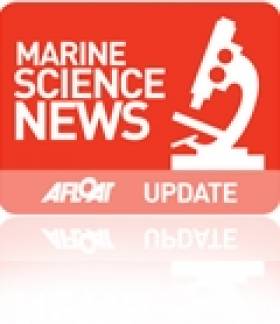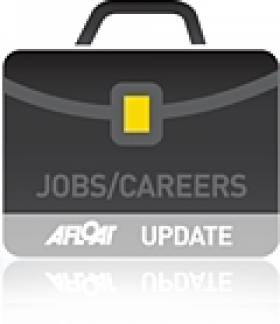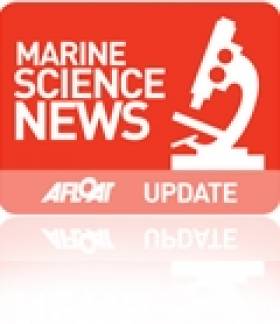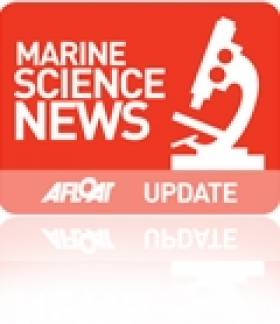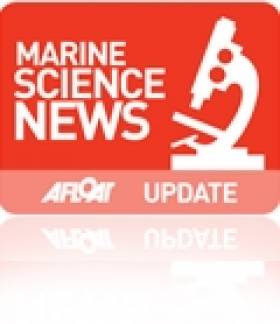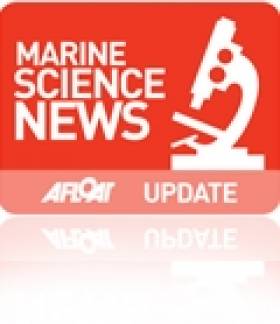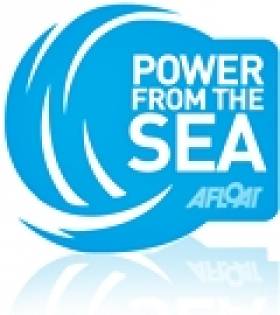Displaying items by tag: marine science
Scientists Discover World of Wonder Beneath the Atlantic
The Irish-led scientific expedition aboard the RV Celtic Explorer has discovered a previously uncharted field of hydrothermal vents along the Mid-Atlantic Ridge.
As previously reported on Afloat.ie, the team includes geochemists, marine biologists, marine geologists, marine geneticists and technicians from Ireland and the UK as well as a three-person TV crew from National Geographic filming for a documentary series to be broadcast next year.
The mission, led by Dr Andy Wheeler of University College Cork, returned to Cork last Thursday from an investigation 3,000 metres below the sea surface using their Remotely Operated Vehicle (ROV) Holland 1 at the first hydrothermal vent field to be explored north of the Azores.
Hydrothermal vents, which spew mineral-rich seawater heated to boiling point by volcanic rock in the Earth’s crust below, are home to a rich variety of marine life that thrives in complete darkness on bacteria fed by chemicals.
“On the first dive, we found the edge of the vent field within two hours of arriving on the seafloor, ” said Dr Wheeler. “Often the search for vents takes much longer, and our success is a testament to the hard work and skill of everyone on board.”
The field has been named the Moytirra Vent Field, after a battlefield from Irish mythology that means ‘Plain of the Pillars’.
“In comparison with other vent fields, Moytirra contains some monstrous chimneys and is in an unusual setting at the bottom of a cliff - a real beauty,” said Patrick Collins rom NUI Galway’s Ryan Institute.
His colleague John Copley of the University of Southhampton added: “Using the ROV’s high-definition video camera, we’ve watched unusual orange-bodied shrimp crawling around the chimneys, among clusters of tiny green limpets.
“Elsewhere there are writhing scale-worms, swirling mats of bacteria and eel-like fish – a riot of life in this unlikely haven on the ocean floor.”
Speaking from the RV Celtic Explorer in Cork, Marine Minister Simon Coveney hailed the “exciting new discovery”.
“Ireland is positioning itself as a centre for marine research from a European and international perspective and this work should be supported and welcomed,” he said.
The Stagiaire position is an excellent training opportunity for a recent graduate. The position will be based in Galway. For further information on description of the position, duration of contract and how to apply click HERE and note that the closing date is 12 noon on Friday 5th August 2011.
- Marine Institute
- marine science
- Research Vessels
- RV
- Marine Science News
- Marine Institute vacancies
- Marine vacancies
- Irish marine vacancies
- Irish marine careers
- Marine Institute Stagiaire Programme
- Marine Institute Oranmore
- Irish marine science news
- RV operations
- Jobs and Careers
- Irish marine jobs and careers
- Jobs and careers news
Marine Education Programme Makes a Splash
The wonders of Ireland's marine life came to the LifeTime Lab in Cork on Monday with the launch of a fortnight of school visits in tandem with the Explorers marine education programme for primary schools.
The programme aims to empower primary teachers to include marine themes in their classes via specially devised lesson plans and support services adapted to the curriculum, including in-service cources on seashore ecology, marine history, arts and crafts, and mathematics.
“The Explorers Programme focuses on Ireland’s two greatest natural resources – our vast undersea territory and our young people,” said Dr Peter Heffernan, CEO of programme partner the Marine Institute. “If Ireland is to develop a thriving marine sector in tomorrow’s world, then it will be the young people of today who will make it happen.”
The programme - which has already been rolled out to some 40 primary schools in the west of Ireland from Mayo to Clare, and in six schools in and around the capital - is a collaborative effort between the Marine Institute, Forfas Discover Primary Science, the Galway Atlantaquaria and Galway, Mayo and Clare Education Centres in the west, and the Bray Sea Life Centre and Blackrock Education Centre in the Dublin area.
Manager of LifeTime Lab Mervyn Horgan said his team was "delighted to be involved" in the pilot series of workshops.
"We are always looking for new and innovative ways of engaging in science education and raising the awareness of marine science in Cork classrooms can only bring long term benefits,” he added.
For more details visit the Explorers website at www.explorers.ie.
Irish Marine Science Nets €23 million from Europe
This funding from the European Seventh Framework Programme (FP7) will support an estimated 130 young researchers, employment that is of even greater importance in these challenging economic times.
Commenting on the Irish marine research community's performance, Minister for Agriculture, Fisheries and Food Mr. Brendan Smith T.D. said, "Ireland's dramatic success in attracting EU funding to its marine science programmes was achieved by our strategic approach to marine science planning highlighting the National Marine R&D Strategy, Sea Change – A Marine Knowledge, Research & Innovation Strategy for Ireland 2007-2013, a key component of the Strategy for Science and Technology in Ireland (SSTI). It was also assisted by the strong influence the Ireland has brought to bear at European level on the shape of the FP7 that accommodates marine topics as a cross-cutting theme in all FP7 programmes."
This level of funding represents five times the leverage rate that might be expected from a country with Ireland's national investment in marine RTDI (2%) as well as a doubling of the EU grant aid awarded to Ireland's marine science sector under the previous Sixth Framework Programme (FP6), when 59 collaborative projects from Ireland were awarded €10.6 million in grant aid.
The Minister for Enterprise, Trade and Innovation, Mr. Batt O'Keeffe T.D., said, "The sea is arguably Ireland's greatest natural resource. Properly studied and managed, it can create jobs, generate economic revenue and supply the raw materials for new industries ranging from ocean energy and environmental monitoring technologies to marine-inspired pharmaceuticals and food ingredients. The award of funding for these projects show that partnerships between academics and small businesses can yield significant dividends and make an important contribution to the Government's plan for a smarter economy."
Over the years Ireland has gained respect in marine science at European level through its contributions to such key EU strategy documents as The Galway Declaration and the Integrated Maritime Policy and Marine Science Strategy.
"The combination of Ireland's talent for innovative thinking, combined with the enormous potential of our marine resources has already yielded results in terms of new and exciting enterprises with revenue and job creation potential," said Mr. Sean Connick, T.D. Minister of State at the Department of Agriculture Fisheries and Food. "My recent visit to the Marine Institute has convinced me of the excellent calibre of Irish marine scientists and that we as a people will benefit greatly from a strong long term commitment to science and the sea. I wish to congratulate the Irish marine research groups for their excellent performance to date in FP7."
Ireland's scientists and marine science administration play prominent roles in many European and international marine science bodies. Dr. Peter Heffernan, CEO of the Marine Institute, will provide a keynote address at the prestigious Belgian-EU Presidency EurOCEAN 2010 Conference in Oostende, Belgium next month, outlining progress in European maritime and marine science policy since the event was hosted by Ireland in Galway in 2004.
"With continued support at home, through ongoing commitment to national funding programmes such as Sea Change and an appropriate employment framework for 100% EU funded research posts, Ireland has the potential to build on these recent successes," said Dr. Heffernan.
Students Take to the High Seas
Imagine being able to plan, design and carry out your own scientific survey into the seas around us. Last week research students from across Europe were given just such an opportunity when they joined scientists onboard the Irish national research vessel RV Celtic Voyager in waters off Cork.
This unique opportunity for students to gain practical experience in carrying out multidisciplinary marine scientific research is part of the European Framework 7 project EUROFLEETS, and was designed, developed and co-funded by the Marine Institute, Ireland.
Over the course of six days, between the 14th and 19th August, 20 European postgraduate students learned the skills necessary to map the seabed, identify the animals and plants living there, and investigate the local and oceanic currents that influence them. Training focused specifically on operational research and included the deployment of equipment and instrumentation, sample recovery and processing, and data acquisition. Other modules investigated designing and planning a survey, operations and capabilities of research vessels and safety at sea.
Ireland’s Deep Oceans Offer New Opportunities
A team of scientists has just returned from a research mission to sample habitats on the edge of the continental shelf using the Marine Institute’s vessel, the RV Celtic Explorer, and the deep water remotely operated vehicle (ROV) Holland I. The aim of this mission was to explore the little-studied habitats at the edge of the continental shelf, where the depth increases from approximately 400 m to over 3 km. 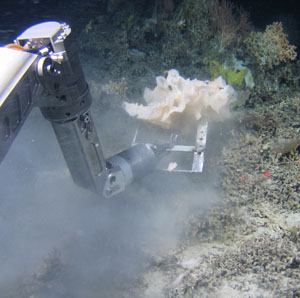
The ROV Holland 1 uses its robotic arm to take a sample of deep water sponge from the deep ocean along Ireland's continental shelf. Picture by NUIG, Copyright Marine Institute.
In addition to mapping sections of habitat, material sampled from the ROV and from cores was passed to taxonomists to help quantify the biodiversity and identify any species that may be new to science. Some sampled organisms will be frozen and returned to the biodiscovery laboratory hosted by the Marine Institute so that they can be made available to researchers looking for new compounds with pharmaceutical potential.
'Biodiscovery' is the term used to describe the collection and analysis of organisms for the purpose of developing new products. Most of the new compounds derived from marine organisms have originated in warm water ecosystems such as coral reefs. To date, relatively little effort has been spent studying bioactivity in temperate waters and the deep sea, despite the abundance here of sponges and other groups known to have great potential for biodiscovery.
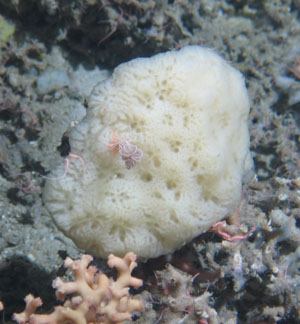
A colony of deepwater sea squirts photographed from the RV Holland 1. Picture by NUIG. Copyright: The Marine Institute.
“A feature of the continental margin is the presence of canyons, which increase the complexity of the margin and may be areas of high biodiversity,” said Project Leader Prof. Mark Johnson of NUI Galway. “Up until quite recently, it has been difficult to sample canyons. Deep sea communities are normally sampled by sending down metal grabs or dredges. These methods do not work well in sloping complex habitats like canyons. In contrast, an ROV can manoeuvre to video and sample organisms with a high degree of precision.”
Samples from the ROV were mostly collected on, or close to, underwater cliffs, some of which were over 100 m high. This sampling included the deepest dive to date with the Holland, to just short of 3000 m deep, twice the depth of the sea floor at the site of the Deepwater Horizon oil leak in the Gulf of Mexico. Organisms were collected using the robotic arms of the ROV, sometime using a suction hose to draw material into a collection box. On surfacing, the collected material was sorted, with material for biodiscovery frozen at minus 80 °C, the best way to preserve the molecules of interest.
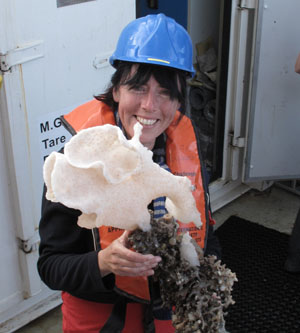
To make the best use of the mission, the scientific team was drawn from several institutes: NUI Galway, University College Cork (UCC), Trinity College Dublin (TCD) and Queen’s University Belfast (QUB). The Chief Scientist was Dr Louise Allcock from NUI Galway. (Picture left: Christine Picton of QUB with deepwater sponge. Photo: Karl Bredendieck). Scientists from UCC are interested in the biodiscovery potential of microorganisms from sponges. This work is complemented by microbiologists from Galway working on the composition and function of microorganisms in the water column. The Trinity team are looking at the links between the canyon habitats and the cycling of nutrients.
Queen’s University Belfast researchers are interested in biodiversity, particularly the taxonomy of sponges. Links to the wider international research community have been made through associating this mission with the Census of Marine Life COMARGE project (http://www.ifremer.fr/comarge/en/index.html).
This mission is partially supported by a Beaufort Marine Biodiscovery Research Award under the Sea Change Strategy and the Strategy for Science Technology and Innovation (2006-2013). The Beaufort Award is a 7-year project linking NUI Galway, UCC and QUB. It provides the human capacity to support this mission, including PhD studentships and postdoctoral appointments.
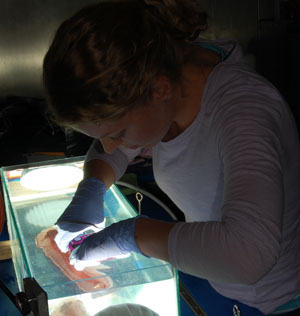
Preparing a sample for storage on board the RV Celtic Explorer. (Photo by Carsten Wolff)
The overall aim of the Beaufort awards is to develop Irish research capacity in five key areas identified in Sea Change, including Marine Biodiscovery, Ecosystem Approach to Fisheries Management, Sensors and Communications Systems for the Marine Environment, Fish Population Genetics and Economic Research related to Development Dynamics of the Marine Sector in Ireland. These awards are managed and supported by the Marine Institute, and funded under the Marine Research Sub-Programme of the National Development Plan 2007–2013.
US Firm to Make Energy from Irish Waters
A US renewable energy company is proposing to meet the Government’s target of generating 500 megawatts of electricity from ocean energy systems by 2020, holding out the possibility of generating tens of thousands of jobs in Ireland. Frank McDonald's story in the Irish Times this morning is here.



























